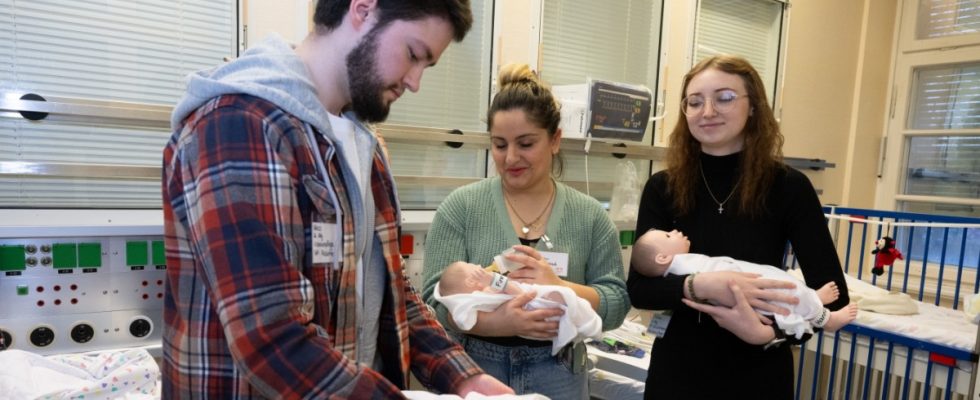Cheap apartments, promising starting salary, leisure activities, paid ticket to Germany: In a meeting room, a woman from the human resources department at the Munich Clinic is advertising the opportunity to work for her company. “What can we offer you if you want to come to us?” she says.
A dozen or so young people are sitting opposite her. Most of them are about to finish secondary or secondary school or they already have a degree from abroad and are taking a preparatory course at the adult education center. It’s “Nursing Practical Day” and the city’s vocational schools are opening their doors to those interested. We want them to see how great the nursing profession is and choose it as many times as possible. Because there is a shortage of nurses. And it is becoming increasingly scarce.
In a large-scale monitoring study, the Bavarian Nursing Association calculates that the tipping point for the state will be reached in 2028, at which more nursing staff will retire than new ones will come. This means that the health and care industry, which is already struggling with a staff shortage, will be in serious trouble in six years at the latest. At the same time, the study predicts a growing need for care in the population; there will simply be more and more old people. “Fewer nursing staff with increasing demand: This is becoming a real problem,” says Thomas Klie from AGP Social Research, a research institute for gerontology and nursing. He led the study together with the Institute for Applied Nursing Research (DIP).
Because nursing is such a shortage profession, young professionals in this industry are literally courted, says Klie. This impression also emerged during the practice day this afternoon at the Munich Clinic. The head of the academy, Rainer Ammende, spreads his arms when he speaks to the students: “Many nursing staff are needed.” These young people can choose where they want to go – and they will be warmly welcomed there. “We would love to hire them all straight away,” jokes one of the organizers on this trial day.
One that could actually start right away is Sirree Jawad. The 30-year-old is already a trained nurse, as she explains. Unfortunately, her training from Iraq is not recognized. That’s why she has to go through the training here again, three years, to become a recognized nursing specialist. As a mother of four, with three children born prematurely, she would like to work in the premature and neonatal ward in the future, she says. After being greeted by the academy director, she and the other interested parties go to the practice dummies – plastic babies – in the practice room. Two trainees and a practice instructor show them how, for example, they can take the temperature of very young patients or take blood. Or how to hold them properly.
You are free to decide which institution you want to work in later
Regardless of whether the trainees later want to care for children, the elderly or all other patients, they have been following the same path since 2020 and are doing the so-called generalist nursing training. You are then free to decide which facility you want to work in later. The nursing shortage is enormous in all areas. However, there is this very unpleasant peculiarity in geriatric care: that the number of patients will increase so much in the coming years that the system is in danger of collapsing.
The city of Munich is no exception. The expert Klie says about the situation in the Bavarian capital that health care is currently still relatively good. “Only with a view to the future and the demographic dynamics will it not be possible to maintain this level.” This is despite the urban pull effect, despite the fact that Munich is very good at acquiring nursing staff from third countries, despite the constant training capacity. Are the city’s retirement homes prepared for this?
Renate Binder sounds confident. Since last fall, she has been managing director of Münchenstift, probably the largest company for older people in need of care in the city. She sits in her bright corner office and says confidently: “Our company currently has no shortage of nursing staff.” This can also be seen in the fact that their houses are fully occupied.

On the day of care, a blue light is used to check whether the hands are really clean.
(Photo: Catherina Hess)
In fact, in many other hospitals in the country, beds are chronically empty because there is a lack of staff. According to the nursing statistics from 2021 from the Bavarian State Office for Statistics, there is an average utilization of the available places of 84.6 percent in fully inpatient long-term care, the rest is usually not available due to a lack of staff. In Munich, for example, the St. Josefs Association recently had to file for bankruptcy due to staff shortages, among other things, and announced that it would close its nursing home in Haidhausen.
Münchenstift boss Renate Binder knows how tight the labor market is, which is why they are working to permanently counteract the nursing shortage, so to speak. The human resources department, for example, is busy recruiting nursing staff from abroad. There are onboardings, language courses, apartments, support in all areas of life. Special programs are being used to try to retain employees who, for example, are no longer able to do physically strenuous work in geriatric care as they get older. The nursing job requires self-care.
For Renate Binder, the key to a full house is retaining her staff. She talks a lot about appreciation, about skills, about good working conditions. However, as a municipal company, Münchenstift has an advantage. They don’t have to maximize profits, says Binder, “but rather make sure that we fulfill the city’s mission well. It’s about having good concepts for the people of Munich in old age.”
But what Binder also says: “We urgently need to think about other care concepts.” Inpatient care is only part of the care. As a society, we would have to manage to support people in their homes for as long as possible. Good neighborhood concepts are needed, as are neighbors or friends who can help out. And a geriatric care facility also needs to become much more of a contact point, including for self-employed seniors who then stop by the café for lunch, for example, says Binder.
The profession must also become more attractive for high school graduates
Social researcher Thomas Klie also speaks of new concepts. A more efficient overall system is needed that eliminates the strict separation between outpatient and inpatient care, as is the case at the moment. For Klie and also for Binder it is also clear that the nursing profession needs to be further developed in the future so that it becomes more attractive for high school graduates. Both demand greater professional responsibility.
In fact, Federal Health Minister Karl Lauterbach (SPD) announced a “fundamental nursing reform” in December. Potential has so far remained unused, according to a preliminary key points paper on the announced Nursing Competence Act. The “pool of competent people in care needs to be expanded,” especially in times of demographic change. What and when it will end is unclear. What is clear is that the current system will not last much longer.

